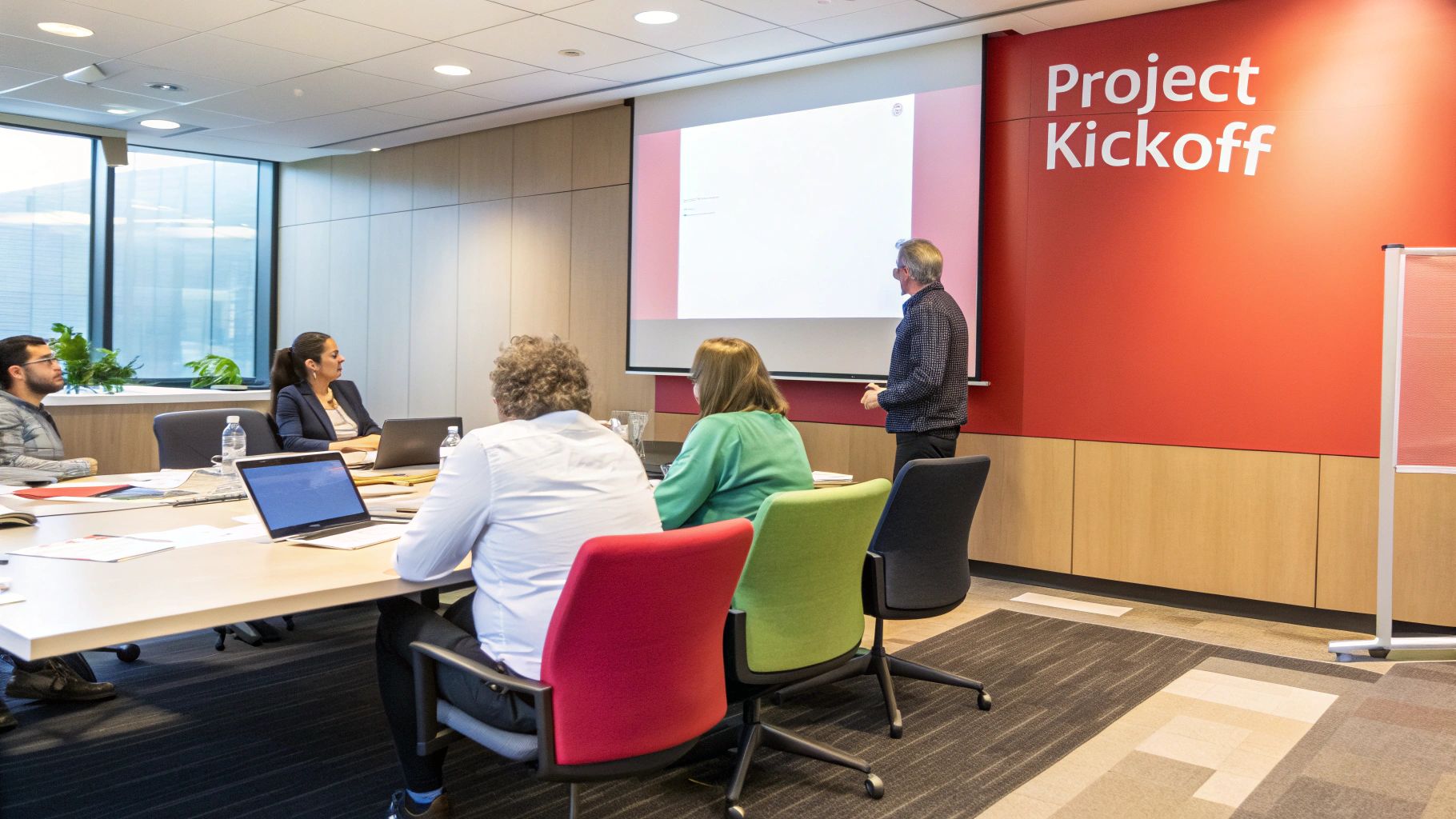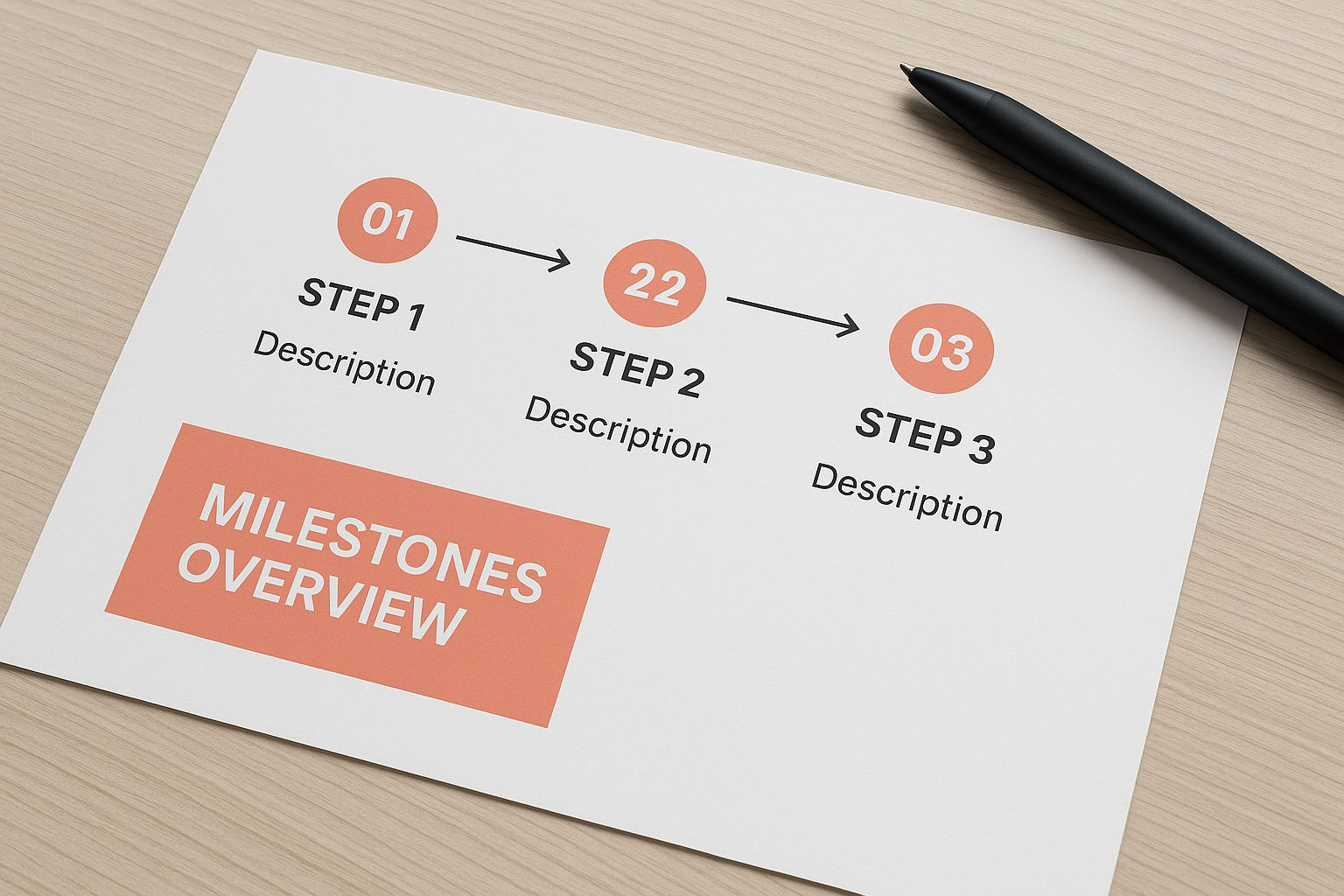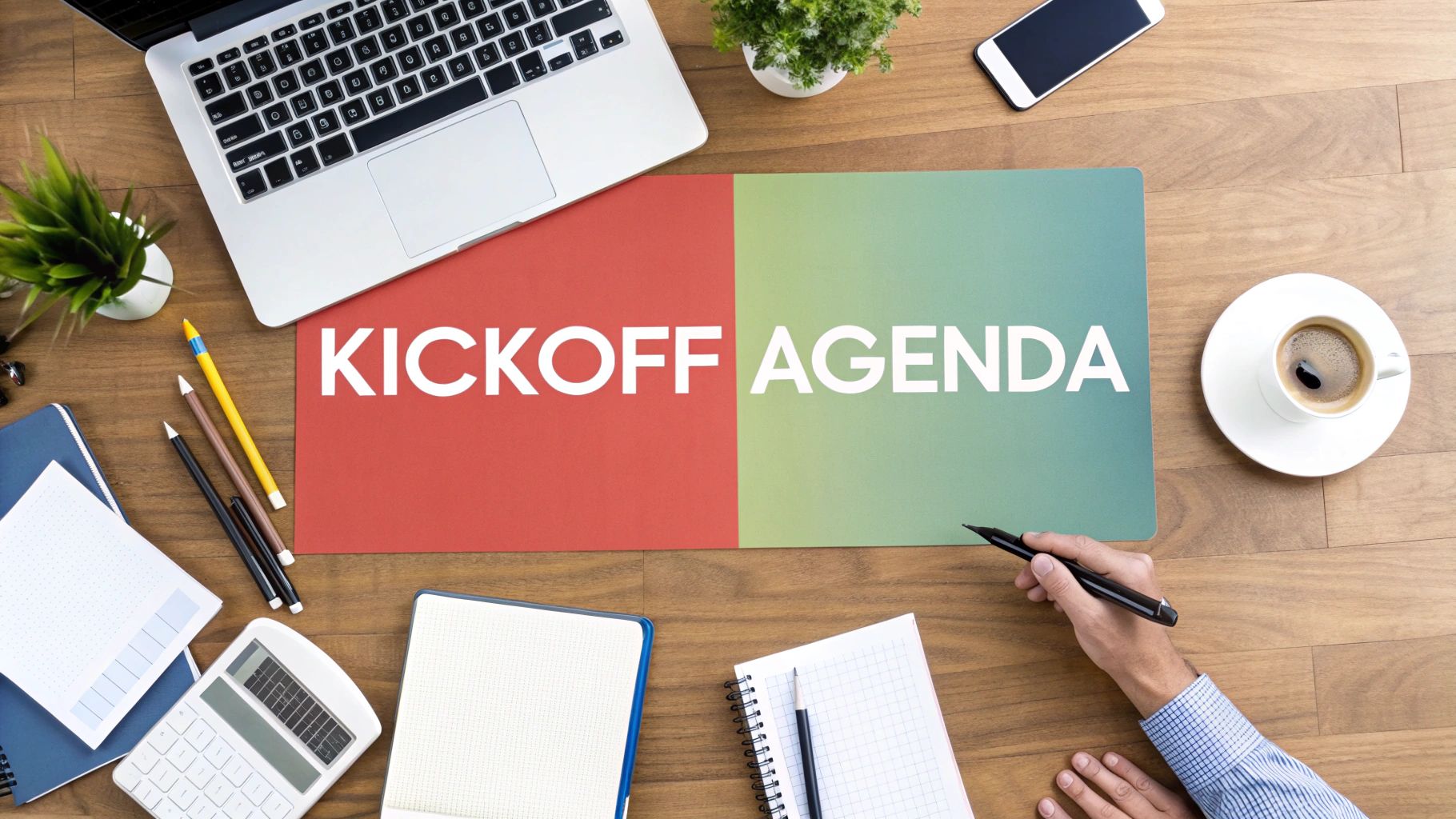A rock-solid project kickoff meeting agenda is the foundation of every successful agency-client engagement. It's more than a simple checklist; it's a strategic tool that aligns stakeholders, sets crystal-clear expectations, and cements your agency's authority from the very first call. A well-crafted agenda ensures a productive meeting, preemptively tackles scope creep, and builds immediate client confidence in your team.
Why a Detailed Kickoff Agenda is Your Agency's Secret Weapon

For any agency, the first official client meeting is a make-or-break moment that sets the tone for the entire relationship. A disorganized kickoff can lead to mismatched expectations, a shaky partnership, and the dreaded scope creep before you’ve written a single line of code or designed a single graphic. This is where a meticulously crafted agenda becomes your most valuable asset.
This document serves as your roadmap, steering the conversation and ensuring every critical point gets the attention it deserves. It forces both your agency team and the client’s key players to think through the project's most important details before the real pressure kicks in.
Building Client Confidence from Day One
A detailed agenda isn't just about being organized; it’s a powerful signal of your agency's professionalism and foresight. When a client sees you’ve anticipated everything from high-level goals and timelines to communication rhythms and potential risks, it builds instant trust. They don’t just see a vendor; they see a capable strategic partner who can guide them to a successful outcome.
This initial vote of confidence is crucial for the agency-client dynamic. It fosters a collaborative spirit, making clients more likely to respect your expertise and processes for the duration of the project. It's your first, and best, opportunity to establish your authority.
A well-structured project kickoff meeting is crucial for aligning stakeholders and setting a clear roadmap, significantly influencing project success. By addressing key aspects upfront, kickoff meetings help prevent scope creep and enhance team accountability. Discover more insights about project kickoffs on cflowapps.com.
Aligning Your Agency Team with Client Stakeholders
Let's be clear: the kickoff agenda isn't just for the client. It’s an indispensable alignment tool for your own agency crew. It guarantees that everyone, from the project manager to the lead designer, knows their role, understands the precise scope, and is clear on what success looks like. This shared understanding eliminates internal confusion and helps you present a competent, united front.
Ultimately, the agenda is the bridge connecting your agency's talent to the client's business goals. It turns abstract objectives into a concrete, agreed-upon action plan. Capturing these decisions is vital, and it's essential to understand how to take better meeting notes to ensure nothing gets lost. This document becomes the single source of truth that guides every step that follows.
Pre-Meeting Prep: The Agency's Pre-Flight Checklist for a Flawless Kickoff
A powerful project kickoff meeting doesn't just happen; it's engineered. The real work for your agency begins long before anyone joins the video call. This pre-flight checklist is your key to walking into that meeting prepared, confident, and ready to lead. You'll set the stage for a session focused on high-level strategy, not basic fact-finding.
The very first step is an internal huddle—a pre-kickoff—to get your own team aligned on the project’s core. This ensures you present a united, organized front to the client.
- Confirm Project Goals: Go back to the statement of work (SOW) and any notes from the sales process. What's the number one business objective the client is trying to hit?
- Solidify Team Roles: Get crystal clear on who owns what. Who is the main point of contact? Who is the lead strategist? Who’s fielding the technical questions?
- Draft Initial Strategy: Sketch out a preliminary, high-level approach. This isn't the final plan, but it shows the client you've already been thinking strategically about their business, which builds immediate confidence.
Gathering Client Intel and Assets in Advance
Once your internal team is on the same page, it's time to proactively gather what you need from the client. Sending a clear, consolidated request list beforehand saves a massive amount of time and shows off your agency's efficiency. You want to avoid the meeting turning into a scavenger hunt for login credentials.
Your request list should cover access to crucial platforms and key documents. For instance, your agency will almost always need:
- Brand guidelines and logos
- Access to their website CMS
- Logins for analytics and advertising accounts
- Contact information for all client-side stakeholders
Taking this step upfront ensures the actual meeting is spent on high-value discussions about the project kick off meeting agenda, like defining scope and success metrics, rather than tedious administrative setup.
A common mistake is treating the kickoff as the starting point for information gathering. It should be the starting point for collaboration. Arrive with as much context as you can possibly get to maximize the strategic value of everyone’s time.
Finalizing Logistics and Setting Expectations
Finally, it’s time to nail down the logistics. Double-check your attendee list to make sure every key decision-maker from both your agency and the client will be there. A miscommunication on this point alone can derail a project before it even starts.
Send out the finalized agenda at least 48 hours in advance. This isn't just a courtesy; it gives stakeholders time to review the plan, gather their thoughts, and come ready to contribute. For agencies working with clients across the globe, mastering strategies for scheduling meetings across time zones is a non-negotiable part of this prep.
These simple steps respect everyone's time and reinforce your agency's professionalism, impressing clients before the official meeting even begins.
The Anatomy of a High-Impact Agency Kickoff Agenda
Think of your kickoff agenda as a strategic playbook, not just a simple to-do list. For agencies, every single item on that agenda is an opportunity to build trust, create crystal-clear alignment, and put your expertise on full display. Let's break down the essential components and the "why" behind each one, so you can walk into that meeting and lead with total confidence.
Item 1: Frame the Project Vision, Not Just the Deliverables
Your first move is to frame the project's purpose in a way that clicks with the client’s actual business needs. This isn't the time to just read the Statement of Work (SOW) out loud; it's your chance to tell a compelling story. You need to connect the project deliverables directly to the pain points they shared with your sales team.
For instance, don't just say, "We're going to build a new e-commerce website." Instead, try something more impactful: "Our main goal today is to lock in the plan for redesigning your online store. This new design will directly tackle those cart abandonment issues we discussed and finally deliver that seamless user experience your customers are looking for." You’ve immediately anchored the entire project in business value.
Item 2: Collaboratively Refine Goals Using the SMART Framework
You probably have a set of goals outlined in the SOW, but the kickoff is where you bring them to life. This is the moment to refine and confirm them with the client. The SMART framework (Specific, Measurable, Achievable, Relevant, Time-bound) is your agency's best friend here.
- Specific: What, exactly, are we trying to accomplish? (e.g., Increase organic lead submissions by 20%.)
- Measurable: How will our agency track success? (e.g., We'll track it through Google Analytics form submission goals.)
- Achievable: Can we realistically hit this target with the current scope and resources?
- Relevant: How does this specific goal help their bigger business picture?
- Time-bound: When do we need to hit this by? (e.g., Within six months after the new site goes live.)
Turning this into a conversation ensures the client feels a real sense of ownership over the project’s objectives. It shifts the dynamic from a one-way agency presentation to a genuine strategic working session.
Item 3: Define What's In Scope (and What's Out) to Prevent Scope Creep
I can't stress this enough: this is one of the most critical parts of the kickoff agenda for any agency. You need to clearly spell out every single deliverable included in the project. Just as important, you have to explicitly state what is out of scope.
Explicitly defining what's not included is your agency's best defense against future scope creep. It sets clear boundaries from day one and manages client expectations about what constitutes additional work.
Let's say you're running a social media campaign for a client. You might state: "Our scope covers strategy, content creation, and monthly reporting for Instagram and LinkedIn. This does not include paid ad management or handling community engagement on other platforms like X or Facebook."
Getting this part right is crucial. For a different perspective on how to structure these initial project talks, you can explore this guide on a general Project Kickoff Agenda.
Item 4: Present a Visual Timeline with Clear Milestones
A visual timeline does wonders. It takes the project plan from an abstract concept and makes it tangible and easy for the client to digest. Don't just throw a list of dates at them; show the natural flow of the work and highlight the key milestones. These are the major checkpoints that signal a big phase is complete.
This visual roadmap gets your team and the client on the same page about the project's pace and when to expect key deliverables.

The real value here is that milestones create built-in moments for client feedback and formal approval, which helps you avoid any nasty surprises right before a deadline.
A great kickoff agenda should be both comprehensive and respectful of everyone's time. Here’s a simple template to get your agency started, based on a 60-minute meeting.
Sample 60-Minute Agency Kickoff Agenda Template
This structure ensures you cover all the critical bases efficiently, turning your kickoff into a productive and confidence-building launchpad for the entire project.
Item 5: Define Success with Tangible, Client-Facing KPIs
So, how will we know, objectively, if we've succeeded? This final piece of the puzzle connects directly back to your SMART goals by defining the key performance indicators (KPIs) you'll use to measure success. You have to be specific.
- Bad KPI: "More website traffic."
- Good KPI: "A 15% increase in organic search traffic to key service pages within Q3."
- Good KPI: "Achieve a customer acquisition cost (CAC) of under $50 for the paid campaign."
Focusing on hard numbers reinforces your agency's commitment to delivering measurable results. This data-driven approach is becoming standard practice; in fact, the project management field is expected to need 87.7 million professionals by 2027. It's a clear sign that meticulous, data-backed planning right from the start isn't just a nice-to-have—it's essential for any modern agency.
Common Agency Kickoff Meeting Pitfalls (and How to Sidestep Them)
Even with the most meticulously crafted agenda, a kickoff meeting can still go off the rails. I’ve seen it happen. For agencies, you have to remember that a kickoff isn’t just a logistical checkpoint; it's a performance. It’s your first real chance to set the tone for the entire client relationship, so knowing the common traps is the first step to avoiding them.
Pitfall 1: One Person Dominating the Conversation
One of the most classic derailments is letting a single, loud stakeholder take over. You know the type. It often comes from a senior client who wants to assert their authority, but the result is the same: other crucial voices get drowned out, and your carefully planned agenda gets hijacked. Suddenly, the entire meeting is lopsided, leaving you with skewed priorities and zero input from the quieter, but often equally important, team members.
This is where your facilitation skills truly shine. Your job as the agency lead is to gently but firmly steer the conversation back on track without making the dominant person feel shut down. It's a delicate balance. We actually have a whole guide on this, and it’s worth a read: 7 meeting facilitation techniques to elevate agency-client engagements.
Pitfall 2: Getting Lost in Technical or Tactical Weeds
Another pitfall I see all the time is diving way too deep into technical jargon too early. A client might ask a super-specific question about a piece of code or a platform feature, and before you know it, the whole group is down a rabbit hole that has nothing to do with the strategic goals of a kickoff.
While those details have their place, the kickoff is about the "what" and the "why," not the "how." You have to tactfully redirect. I find something like this works well: "That's an excellent, detailed question for our tech lead. I've made a note of it, and we'll be sure to get you a full answer in our first technical check-in. For now, let’s stay focused on our main project goals." This simple move validates their question while protecting the meeting's momentum.
The real goal of a kickoff is to build a shared vision and a clear path forward. If you walk away with mismatched expectations or fuzzy next steps, the agenda has failed, no matter how perfect it looked on paper.
This isn’t just an agency-world problem, either. Think about the construction industry, where kickoff meetings are make-or-break for getting architects, contractors, and clients on the same page. A review on Procore.com about construction kickoffs highlights how these meetings are essential for defining responsibilities and creating a single source of truth—preventing hugely expensive delays down the line.
Pitfall 3: Ending with Vague or Unassigned "Next Steps"
Honestly, this might be the most damaging mistake of all: ending the meeting without crystal-clear, actionable next steps. Everyone’s excited, the vibe is great, you all sign off… and then, crickets. Who’s supposed to send the recap? When does the client need to get you that content?
Ambiguity is the absolute enemy of momentum. Your agenda needs a dedicated slot for "Next Steps" where you verbally confirm every single action item, assign it to a specific person, and give it a deadline.
- Action: Agency to send the meeting recap & project timeline. Owner: Agency PM. Due: EOD Tomorrow.
- Action: Client to provide access to their Google Analytics. Owner: Client's Marketing Director. Due: End of Week.
- Action: Agency to schedule a follow-up technical deep dive. Owner: Agency Tech Lead. Due: By Tuesday.
When you leave the meeting with a public to-do list like this, you turn all that positive energy into immediate, tangible progress. It shows you’re not just a creative partner, but a highly organized leader who knows how to get things done.
Post-Meeting Actions: How Your Agency Can Lock In Success and Momentum

You can feel the buzz after a great kickoff. Everyone's energized and aligned. But that positive energy has a short shelf life. As an agency, the real work starts the second that video call ends. Your follow-up is what turns all that great conversation into actual progress, making sure the decisions made don't just fade away into the email ether.
Frankly, these post-kickoff steps are just as important as the project kick off meeting agenda itself.
The first thing on your list? Send a detailed recap email within 24 hours. This isn't just good manners; it's a strategic move for your agency. It solidifies everything that was agreed upon and creates the first official record of the project. A quick, thorough summary proves your agency is on the ball, reinforcing the client's decision to hire you.
Crafting the Perfect Client Recap Email
Think of your recap email as more than a simple "thanks for your time." It needs to be a clear, scannable document that becomes the project's initial source of truth. The whole point is to leave zero room for confusion or "I thought we said..." conversations down the line.
I've found the most effective recaps always include these key pieces:
- A quick summary of the big decisions. Reiterate the final project goals and scope. I always make a point to specifically call out the "out of scope" items again here.
- A clean list of action items. Don't be vague. For every single task, name the owner (whether it's someone on your agency's team or the client's) and assign a clear due date.
- Links to key resources. This is where you link to the project board in your PM tool, the shared Google Drive folder, or any other documents you mentioned.
For a deeper dive, we've put together a complete guide on this very topic. Check out our resource on crafting effective after-meeting emails to clients for some great templates and pro tips.
Your follow-up isn't just admin work. It's the engine that turns discussion into action. A slow or fuzzy follow-up can kill a project's momentum before it even has a chance to build.
Translating Kickoff Notes into an Actionable Project Plan
While the project manager is putting that recap email together, the rest of the agency team should be turning the meeting's outcomes into a real-world plan. This is the moment you switch from talking about the work to actually setting it up. Don't just let those meticulously captured notes sit in a document.
The very next step is to get every task and action item out of your notes and into your agency’s project management platform, whether that's Asana, Monday.com, or ClickUp. Get them assigned to the right people with the deadlines you just confirmed. This simple act makes the project tangible for the entire team.
Finally, while everyone is still focused and motivated, get the next meetings on the calendar. Schedule the first internal team sync and the first official client status call. Putting those on the books immediately sets a cadence for communication and accountability right from the start.
Your Top Agency Kickoff Meeting Questions, Answered
Even with a rock-solid plan, there are always a few lingering questions when you're getting ready for a big client meeting. This is especially true for agencies, where you're juggling client expectations, team resources, and the bottom line. Let's tackle some of the most common questions I hear from agency pros about running a kickoff meeting that actually works.
Q1: Who from my agency really needs to be in the kickoff?
Getting the right people in the room (or on the video call) is a major power move. It shows the client you're organized, confident, and have the right expertise lined up. Your core agency team for the kickoff should always include these key players:
- The Account or Project Manager: This is your quarterback—the central point of contact for the client. Their presence is absolutely non-negotiable. They own the relationship and the project's flow.
- The Lead Strategist or Creative: This might be your lead designer, content strategist, or a senior developer, depending on the project. They’re there to explain how the magic will happen and build the client's confidence in your team's skills.
- A Senior Team Member (for high-stakes projects): If you've landed a major client or a massive project, having a Director or Partner pop in for the first 15 minutes can make a huge impact. It's a clear signal that the project has executive-level support and oversight.
Resist the urge to invite your entire internal team. It's a classic agency mistake. A crowded room can overwhelm the client, make the conversation feel scattered, and, frankly, it’s a terrible use of billable time. A lean, strategic team always makes a stronger impression.
Q2: What’s the ideal length for an agency-client kickoff?
Time is your client's most valuable asset, so respecting it is paramount. I've found the sweet spot for an agency kickoff meeting is between 60 and 90 minutes.
For most projects where the scope is pretty clear and you have a small group of stakeholders, 60 minutes is perfect. It’s just enough time to hit all your agenda points with purpose and not feel rushed.
However, for bigger, more complex initiatives—think a complete website overhaul or a multi-channel brand launch—you’ll want to book 90 minutes. That extra half hour is a crucial buffer for deeper strategic conversations and gives you breathing room for a more involved Q&A session, especially when multiple client departments are involved.
Anything less than an hour feels transactional, which can cheapen your role as a strategic partner. On the flip side, meetings that drag past the 90-minute mark are a recipe for glazed-over eyes and diminished returns.
Q3: How should our agency handle scope creep during the kickoff?
Ah, the classic agency dilemma. You're in the middle of the meeting, and the client suddenly tosses out a "great new idea" that's clearly outside the agreed-upon scope. This is a defining moment where you can either lose control or solidify your position as a true partner.
The key is to Acknowledge, Park, and Redirect.
Here’s a script I’ve used countless times:
"That's a really interesting idea, and definitely something worth exploring. To make sure we give it the attention it deserves and still cover our core agenda today, I'm going to add that to our 'Parking Lot.' We can then schedule a separate call to dive into it as a potential Phase Two or an add-on to this project."
This simple response works wonders for any agency. It does three things at once:
- It validates the client's input, making them feel heard.
- It protects the meeting's agenda and keeps things on track.
- It reframes the new idea as an additional opportunity (and a billable one at that), reinforcing the value of your team's work.
Handling this moment with grace shows you're a firm but collaborative leader who can manage expectations from day one.
Stop losing critical client insights and wasting hours on post-meeting admin. Scribbl automatically transcribes, summarizes, and organizes your client calls, flagging upsell opportunities and potential risks for your agency. Reclaim your team's time and never miss a detail—discover how Scribbl can give your agency an edge.




